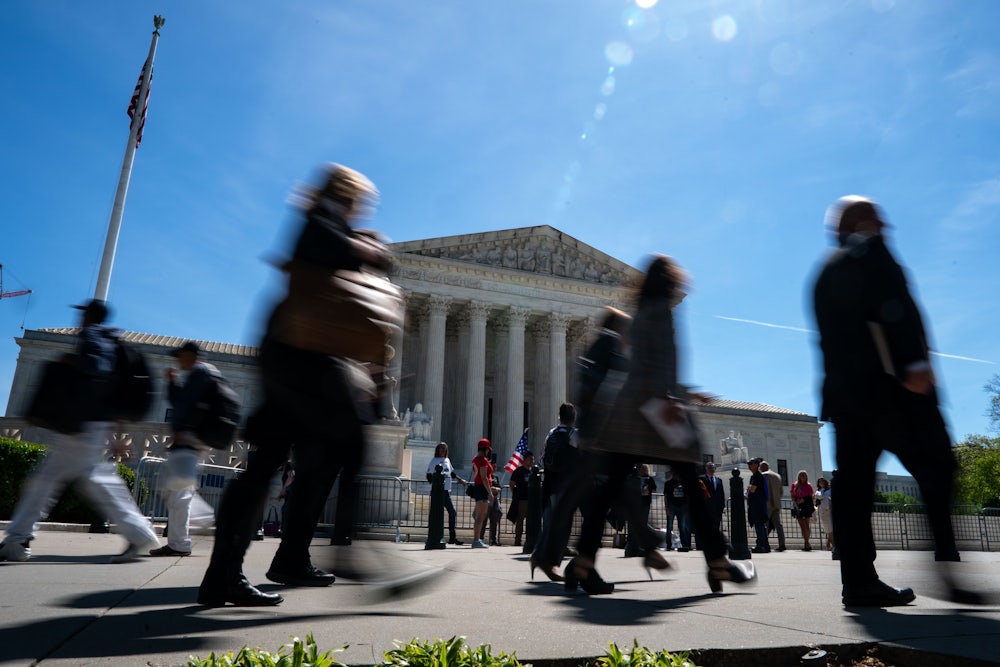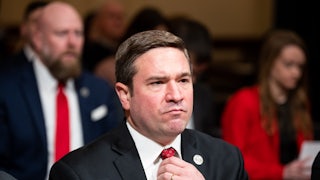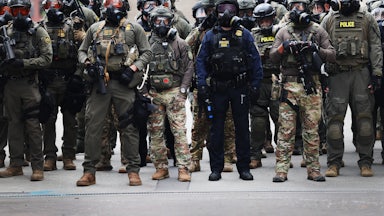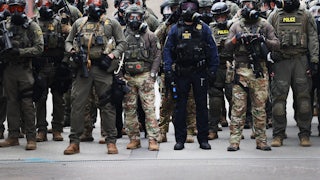This week, the Supreme Court allowed a ban on gender-affirming care for minors to go into effect in Idaho while legal challenges against the law proceed. Its decision is a win for those advancing anti-trans arguments in the sober guise of judicial process. It’s also a disturbing indicator of how much weight the conservative majority on the highest court affords such arguments.
Four years ago, only one state had enacted a ban on providing puberty blockers, hormone therapy, and surgeries to affirm the gender of trans people under the age of 18—Arkansas, whose ban has since been permanently blocked. Since then, nearly half the states in the country have passed similar bans. Many of those bans are still subject to legal challenges, and some are temporarily blocked. But however these bans are fought over in the courts, the result remains: By subjecting young trans people’s existence to debate at every level of the judiciary, lawmakers have sent the message that there is something wrong with young trans people. The speed with which this occurred, along with its geographic scope, risks making it seem like gender-affirming care itself is the cause of the emergency. In reality, politicians and anti-trans groups are benefiting from the crisis they have created for trans youth.
Legal challenges to bans on gender-affirming care have kept many young trans people in limbo; according to the Movement Advancement Project, 36 percent of trans youth (ages 13–17) live in states that have banned gender-affirming care. Some of the bans have been blocked, only for another court to reverse the block, as happened in Idaho. This is what put the Idaho ban in front of the Supreme Court, which had not been asked to fully consider the ban itself but, rather, whether the ban should be temporarily blocked while the case proceeded. The court’s decision this week will only block the ban for the two anonymous trans girls who are plaintiffs in the challenge, leaving all others in the state who need care out in the cold as the ban returns to the lower courts for consideration. “The legal uncertainty surrounding this medical care is creating chaos across the country for adolescents, families, and doctors,” noted a recent petition to the Supreme Court regarding the Tennessee ban, filed by the American Civil Liberties Union. (The court has yet to decide whether it will take up the case.)
Now the Christian nationalist legal organization Alliance Defending Freedom is representing the state of Idaho, raising ethical questions about the outside group’s involvement. ADF is perhaps most known for getting specious cases in front of the Supreme Court: ADF brought the current legal challenge to Food and Drug Administration approval of mifepristone, FDA v. Alliance for Hippocratic Medicine, designed to limit abortion access after Dobbs (which ADF also engineered), as well as last year’s fake-wedding-website case, 303 Creative v. Elenis, which was meant to erode anti-discrimination protections for LGBTQ people. ADF has also been championing bans on gender-affirming care across the country, regularly testifying in support in state legislatures.
Prior to the Supreme Court declining to stay the ban this week, Idaho was losing its battle in the courts—resoundingly. When Federal Judge B. Lynn Winmill temporarily blocked enforcement of the law during the legal challenge, he agreed with the plaintiffs without equivocation, finding that the Idaho ban violated the equal protection clause of the Fourteenth Amendment. His order placed the plaintiffs’ case in a broader history of the Fourteenth Amendment, as well, citing its “primary role … to protect disfavored minorities and preserve our fundamental rights from legislative overreach. That was true for newly freed slaves following the civil war. It was true in the 20th Century for women, people of color, inter-racial couples, and individuals seeking access to contraception. And it is no less true for transgender children and their parents in the 21st Century.”
Enter Alliance Defending Freedom. The state appealed the district court’s ruling temporarily blocking the ban in the Ninth Circuit, and it failed there, as well. But then ADF joined the case, assisting Idaho Attorney General Raúl Labrador in filing an emergency motion to the Supreme Court seeking to enforce the law against everyone who wasn’t suing them. They framed this as a narrow question about temporary injunctions, perhaps an easier fight to win considering their losses so far. However, in ADF’s request to the Supreme Court, it elevated pseudoscience to argue for the urgency of enforcement. It made use of a discredited paper that claimed young trans people were the products of “social contagion.” ADF also erroneously contended, citing an opinion piece in The New York Times by columnist Pamela Paul, that “more and more minors” are “voicing their regret for taking this path.” But perhaps it is no surprise that in the course of defending a law that disregards trans youth identities, the law’s defenders continue to cast doubt on them. In some respects, ADF has won only on a technical question about temporary injunctions, not on the core question of whether the bans are constitutional. But it’s a win for ADF, which, as a new brief from the Center for American Progress outlined, may well try to repeat this strategy in other states and on other concerns of bodily autonomy.
The Supreme Court’s ruling on the temporary injunction will have a massive impact, even if Idaho should go on to lose when the case is actually considered on the merits. The truth is, the pace of anti-trans laws being enacted may be slowing this year. Other legal challenges to health care bans are proceeding. However, should those bans go into effect, even temporarily, young people who were using puberty blockers will have to stop, and puberty will begin. Young people who were using hormones will have to stop, and the effect of the hormones will be blunted. Families who leave the state in order to protect their trans kids will have already had to uproot and upend these kids’ lives in the process.
The legal challenges to these bans are premised on the harm caused by the bans. That harm involves denying access to time-sensitive medical care. If the bans are enforced while the legal challenges are considered, that harm will have already occurred. Trans kids lives’ cannot just be put on hold, pending some ruling someday.








